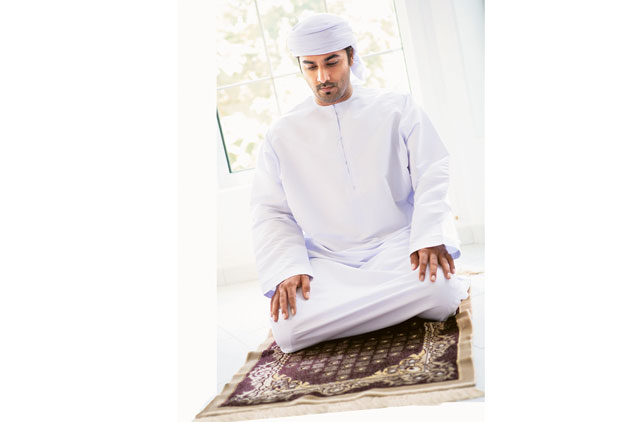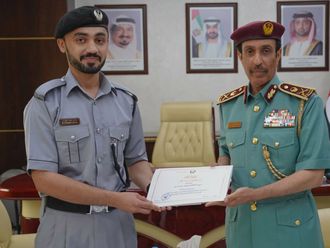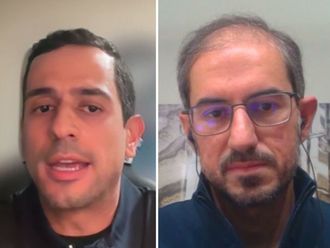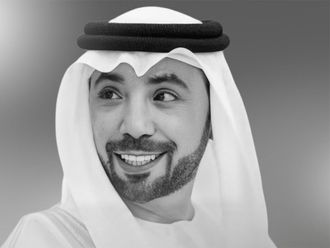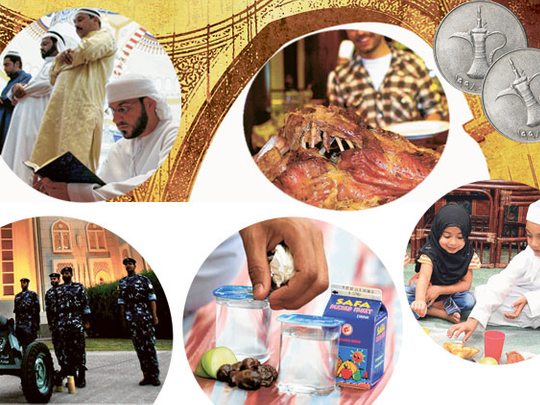
Ramadan is all about caring, sharing and getting closer to Allah. Muslims try to spend more time praying, saying dua'a (invocations), reciting the Quran and giving more to charity during the month, as the rewards of good deeds in Ramadan are multiplied. Muslims become extra keen to maintain their regular religious duties during the fasting month, and try to make room for additional rituals as these are only done or observed during the blessed month.
Recital
One of the most common rituals of Ramadan is Quran recital. Muslims try to finish reciting the entire Quran at least once during the month. This is sometimes done as group recitals where a family or a group of friends sit together and each recites a portion of the Quran until they finish it. This can take days or the entire month, depending on how much they read per sitting.
Changed habits
As Muslims fast from dawn until dusk, their eating habits change. Instead of having the three main meals of the day, they have two: suhour and iftar. Suhour is a meal taken before sunrise and before Al Fajr (dawn) prayer. It is the last meal before the fast starts.
Ending the fast
After sunset, or when Al Maghreb prayer sounds, iftar, or the meal that ends the fast, is eaten right after. It is considered the big meal of the day. Usually the fast is ended with water and dates, following in the footsteps of Prophet Mohammad (PBUH), and then a regular meal is consumed.
Sharing with friends
The Ramadan spirit encourages people to get together for meals and be good to one another. That is why it is very common that iftar is usually a communal meal, shared with family and friends whenever possible.
Special evening prayers
During Ramadan, Taraweeh prayers are also performed. They are special evening prayers that are only conducted in Ramadan after the Isha prayer. Long portions of the Quran are recited. These prayers vary in length, as they could range from as short as eight raka'a and as long as 22 raka'a. Taraweeh prayers are not a must, but are recommended (Sunnah) by Prophet Mohammad (PBUH). They are held in congregation in mosques but could also be done at home, in groups or individually.
The word ‘Taraweeh' comes from an Arabic word meaning to rest. Because the prayer can be long and includes various acts of standing, bowing, prostrating and sitting, one sits for a brief period of rest after each four cycles. That is why they are called Taraweeh prayers.
Cannon firing
A unique, age-old Ramadan ritual, is the Ramadan cannon. Traditionally, two cannon shots are fired to announce the start of Ramadan and the morning of Eid Al Fitr (festival of ending the month of fasting), while one shot is fired every evening as Al Maghreb prayer is about to begin, signalling iftar time. You can witness it at the following locations:
Dubai: Musalla Deira area; Musalla Karama; Outside gate No. 4 at Al Safa Park.
Sharjah: The roundabout in front of the Cultural Palace in Al Falaj area (Aired everyday on Sharjah TV); Al Noor Mosque in Al Buhaira Corniche; Al Huda Mosque at Al Khan
Note: Abu Dhabi has never followed this tradition
Charity iftars
All through Ramadan, charity iftar meals are served at different locations, usually in large tents near mosques, for those who cannot afford a meal. These are called "Mawaed Al Rahman." Mosques also provide dates, water and sometimes juice to the congregation waiting to offer Al Maghreb prayers. Some families send food and drinks to mosques so they can also be given out to the congregation.
Giving to charity
Charity is emphasised as one of the major spiritual aspects of Ramadan. What better time to give to charity than when the rewards of giving are greater than any time of the year. Prophet Mohammad (PBUH) said: "Save yourself from hellfire by giving even half a date-fruit in charity."
There is no shortage on donation boxes and booths around the Emirates.
Some suggestions for donation this Ramadan: UAE Red Crescent Authority, Dubai Cares' "Girls' Education Campaign", the Noor Dubai Foundation that aims to eradicate blindness all over the globe and the Dubai Outlet Mall Charity Campaign where you can donate clothes, books and non-perishable food.
Did you know
6,236 is the number of verses (Ayaat) in the Quran.
114 is the number of chapters (Surah) of the Quran.
30 is the number of portions (Ajza'a) of the Quran.


